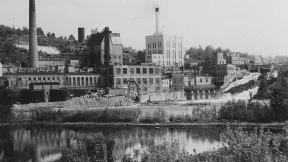Forest Management & Biodiversity
As a significant consumer of wood pulp for our tissue and personal care products, Kimberly-Clark focuses strongly on responsible, sustainable forest management practices across our supply chain. By including use of recycled and other environmentally preferred fibers, we are building resilience and positioning the company for long-term success while simultaneously supporting important environmental and social outcomes.
These efforts also allow us to contribute to a number of the objectives of UN Sustainability Development Goals, including Goal 13, Climate Action, and Goal 15, Life on Land.
Aspiration & Goals
Kimberly-Clark’s aspiration is to reduce our natural forest footprint by 50% while unlocking the power of the world’s forests to help solve the climate and biodiversity crises. By 2025, we aim to:
- Reduce by 50% (baseline 2011) our use of natural forest fibers, which for Kimberly-Clark are primarily fibers from northern boreal and temperate forests
- Source 90% of our tissue fiber from environmentally preferred sources, which include recycled fiber, sustainable alternative non-wood fibers, and Forest Stewardship Council® (FSC®)** certified virgin wood fibers
Learn more about our forest footprint goals and progress in our latest sustainability report
Strategy & Approach
More than a decade ago, we launched a fiber procurement policy that sought to minimize our impact on the world's forests. In May 2024, we published our revised Forest, Land, & Agriculture Policy taking into account the dynamic policy, regulatory and disclosure landscape. The revised policy seeks to address important issues impacting forests, including deforestation and land conversion, forest degradation, and rights of indigenous landholders. Our new policy provides a comprehensive framework that can support Kimberly-Clark's innovation leadership and compliance commitments in forest conservation.
Additionally, we have continued our historic focus on:
1. Increasing our use of environmentally preferred fibers (EPF), including recycled fibers, sustainable alternative non-wood fibers, and FSC®-certified virgin wood fibers
2. Reducing our use of natural forest fibers, which for Kimberly-Clark are primarily fibers from primary and old growth forests usually associated with boreal and temperate forest ranges.
Canada’s boreal forest is an ecosystem of global significance on par with the world’s tropical forests for the environmental, social, cultural, and economic value it provides. The North American Boreal Forest biome, inclusive of Canada and Alaska, is estimated to contain more than 25% of the world’s remaining intact primary forests. Important issues related to commercial forest management in Canada’s boreal forest* include Indigenous rights, biodiversity conservation (including forest management impacts on caribou habitat), and climate change.
For more information, please see our Forests, Land and Agriculture Policy.
Responsible Fiber Sourcing: FSC® Certification
The Forest Stewardship Council® is an international nonprofit organization with the mission to promote environmentally sound, socially beneficial, and economically prosperous management of the world's forests. We believe FSC® certification represents the most rigorous standard for the responsible management of the world’s forests, which is why FSC®-certified virgin fiber is the only virgin fiber we consider to be an environmentally preferred fiber and allow to count toward our goal of sourcing 90% EPF for our tissue products by 2025.
We remain committed to supporting the broad uptake and robust implementation of the FSC® Canada forest management standard and its heightened requirements for the protection of threatened woodland caribou habitat and the upholding of Indigenous rights.
Biodiversity
Our efforts to reduce the use of natural forest fibers in favor of environmentally preferred fibers help protect forest biodiversity and further Kimberly-Clark’s commitment to fight deforestation and forest degradation.
Forest-Dependent Communities
Beyond our commitment to FSC®, Kimberly-Clark is also taking steps to understand how our responsible sourcing practices can support the leadership and authority of Indigenous and other marginalized forest communities within our sphere of influence.
Assessing Forest Climate Impacts
We use life-cycle assessments to help understand the carbon impacts of conventional virgin wood fibers, alternative non-wood fibers, and recycled fibers used in our tissue products. We have also evaluated biogenic, fossil, and land use change carbon impacts of these different fiber types over a tissue product’s life cycle in an effort to establish Kimberly-Clark’s first-ever baseline of our Scope 3 land-use emissions.
Using this baseline and applying both the forthcoming GHG Protocol Corporate Accounting Standards for land-use emissions and removals and the new SBTi target-setting guidance for the forest, land, and agriculture sectors, we intend to progress Scope 3 land-use emissions reductions.
Palm Oil Derivatives
Kimberly-Clark does not directly purchase palm oil or palm kernel oil; however, we purchase some chemicals that are derived from palm oil sources. To help ensure we are sourcing these responsibly, Kimberly-Clark joined the Roundtable on Sustainable Palm Oil (RSPO) in February 2020 and has attained RSPO chain-of-custody certification at two operating sites thus far. For more information on our RSPO certification implementation, see our RSPO Profile.
Partnerships
Strong partnerships are critical to engaging the global supply chain in responsible forest practices.
Forest Stewardship Council® (FSC®)
- In 2023, the Kimberly-Clark Foundation continued its support of FSC®’s efforts to expand the performance monitor framework for the FSC® Canada forest management (FM) standard to include an assessment of how Intact Forest Landscapes (IFLs) within FSC® FM certified forests are being managed and/or protected.
World Wildlife Fund (WWF®)
- We are participating in Forests Forward, WWF®’s corporate program that engages companies around the world to help them reduce their forest footprint and support other on-the-ground actions—like forest restoration—to keep forests thriving for people, nature, and climate.
- In partnership with WWF®, we support the Center for Heirs’ Property PreservationTM, the Mississippi Center for Justice, and these organizations’ critical work on the Mobile Basin Heirs’ Property Support Initiative, which provides legal services, assistance, and resources to help historically underserved Mississippians keep generational land and conserve working forests.
*Boreal forest (canada.ca)
** Kimberly-Clark FSC® Certification: FSC® C103572
Published June 2024










